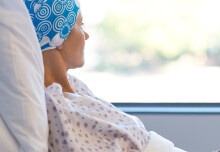

Eminent toxicologist dies aged 68 <em> - News </em>
See also...
Division of Surgery, Oncology, Reproductive Biology and Anaesthetics
External sites:
(Imperial College is not responsible for the content of these external internet sites)
This week Imperial learned of the death of John Henry, Emeritus Professor of Accident and Emergency Medicine in the Division of Surgery, Oncology, Reproductive Biology and Anaesthetics and an Honorary Consultant at St Mary's Hospital.
Professor Henry was highly respected for his intellectual rigour and his great interest was in the effects of drugs and toxicity. He received plaudits from colleagues at both Imperial and St Mary's for being a brilliant toxicologist, whose encyclopaedic knowledge meant he could spot relevant clinical symptoms and signs long before others.
Professor Henry joined Imperial from Guy's and St Thomas' Hospital in 1997 and broke new ground in the management of poisoning and drug overdose. He introduced the fatal toxicity index for antidepressants, which changed prescribing practice; pioneered the introduction of alpha1 acid glycoprotein as an antidote for drug toxicity; and developed and introduced a new near-patient test for salicylate and paracetamol. He was also chief medical editor of the BMA Guide to Medicines and Drugs.
The way in which drugs could devastate the young was one of his particular concerns. He explained how cannabis was actually much more dangerous than simple tobacco and ate away at users’ volition, drive and dignity, destroying the personality and having devastating effects on society. He also described how ecstasy and amphetamines could cause death through hyperpyrexia and dehydration.
Professor Henry remained busy after his retirement in 2004, continuing as a medico-legal expert in the field of toxicology and providing valuable opinion in the media.
Colleagues remember Professor Henry as an unfailingly upbeat person, in spite of suffering ill health following the failure of one of his kidneys and a subsequent renal transplant in the 1970s.
"John touched so many lives in such an unusual way that he generated love and respect which will last long after his passing. Having suffered as a patient receiving dialysis for over 7 years in the early days of the 1970s, he lived every day as a blessing from God, and was deeply empathetic and compassionate to patients in his care, as well as to friends and acquaintances," said his colleague Dr Mike Platt , an Honorary Senior Lecturer in Professor Henry's Division.
"His deep faith gave him great courage, not only being totally uncomplaining, despite often feeling ill, but always being extremely positive and cheerful. He was first and foremost a very gifted teacher who loved the young and he will be especially missed by all the students who knew him over the years. He was always willing to help out with problems and offer a fatherly ear," added Dr Platt.
Professor Henry is also remembered for his commitment to working with the media. Fiona Fox, Director of the Science Media Centre, said: "John Henry was a dear friend of the Science Media Centre and much loved by the many journalists he helped over the years. He never failed to return our calls – no matter what time of the day or night and no matter how controversial the story. When the tabloid press splashed the story about a planned ricin attck on the London underground, Professor Henry was the expert who balanced the hysteria by pointing out that London commuters could in fact sleep in it or swim in it with no problem, because ricin would be fatal only if injected into the blood stream.
"That was one just one of many scare stories that he challenged. Having pumped out the stomachs of one too many drug addicts and binge drinkers, Professor Henry often added that society should spend more time worrying about the harmful stuff we put in our bodies every Saturday night than scaring everyone to death about unproven risks," added Ms Fox.
Professor Henry died unexpectedly while an in-patient at Royal Free Hospital, after complications following an operation. He leaves his brother Michael and sisters Siobhan and Gabriel, together with nieces and nephews.
-ends-
Article text (excluding photos or graphics) available under an Attribution-NonCommercial-ShareAlike Creative Commons license.
Photos and graphics subject to third party copyright used with permission or © Imperial College London.





